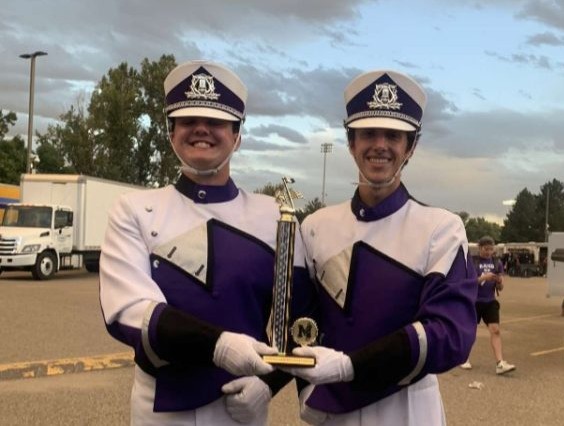Insight to Marching Band

Arvada West marching band goes to state
Marching band is a very isolated activity which means that not a lot of people know about what goes into their performances. Marching band members not only work on marching but also on tone, rhythm, notes, and memorization. All of these tasks have to be well practiced for the marching band to sound and look professional.
Alex Mauger, is a senior and plays the saxophone and is also happens to be the drum major. He has been playing in the marching band for 3 years, and this year is his first year as drum major. The two positions are very different from each other. Playing the saxophone requires a lot of memorization of music. Drum major is conducting which is a whole new set of skills. Conducting requires you to learn how to lead other marching band members.
“Being drum major, the hardest thing is inspiring membership because marching band is super hard but if we can get them inspired then there’s nothing that can stop them.” Mauger explained.
For Mauger, he ends up practicing every day that isn’t a scheduled practice; Wednesdays, Saturdays, and Sundays. The time they are scheduled for practice is from 3:00-6:00 every Monday, Tuesday, Thursday, and Friday. Which means they practice 10 hours a week.
With this amount of practice time and school work needing to be done, it looks very stressful to balance out but funny enough, according to Mauger and his experience, marching band actually helps him get his school work done. The two hours he has outside of school and marching band is when he sits down and works on all of his school work. Just because he knows how to balance out his time management doesn’t mean his stress level isn’t high. He has a very high stress level just not in the way most would expect.
“It’s a good kinda stress, like you stay up worrying because of them not because you don’t have this movement on the field, it’s because you’re genuinely worried about how they are doing and if they’re feeling alright, which makes me feel like a dad, it’s weird.”.
Tanner Custer is a senior as well and he plays the tenor quads and bass drums. The difference between the two is size and technique. With bass drums it’s just one drum at a time and they’re much bigger but with the tenor quads, he’s playing 5 different drums all at the same time.
The biggest challenge for him in this department is weight and staying in shape. “We do a lot of moving and exercising in marching band, so you really do have to be in shape in order to keep moving and keep up and playing for the whole 7 minutes your on the field and for weight it’s really hard on our backs, I where a back brace and so do some of the others since it’s a lot of weight to be carrying for multiple hours at a time so you really have to have good back muscles.” Custer explains.
Abbey Kos is a junior and plays the mellophone and french horn. She plays the mellophone for marching band since it projects more sound on the field unlike the french horn. Kos practices 1 to 2 hours memorizing music, working on tone, and exercises. But even though she does practice that amount of time outside of school and scheduled practices, she still has to get her school work done. “Unfortunately it causes a lot of loss of sleep, school is still a number 1 priority and I like to come home and relax a little and reflect on the day, then I eat dinner and go upstairs and get to work because working on a show is no different then working on homework to me. You have to put a lot of quality and time into them.” Kos explains confidently.
For the marching band this year, they get to go to Honolulu Hawaii and play for the Vietnam veterans day parade which is a huge deal for them, and if they win enough trophies or banners they will also be able to play in the Falcon Stadium in Colorado Springs. Marching band is a family and even though they go through some tough times they are always there for each other.

This is Natasha’s second year in Journalism. She is a sophomore and is very interested in art, music, and writing. She joined this class due to her liking...


